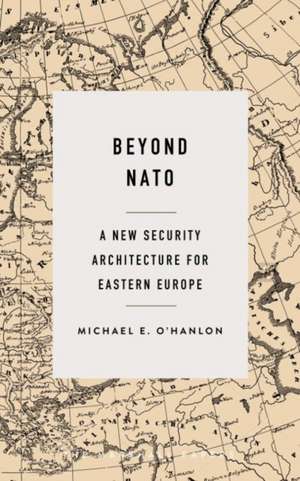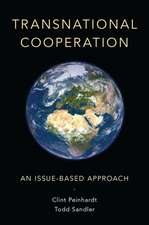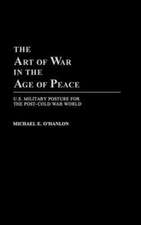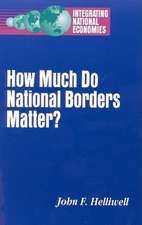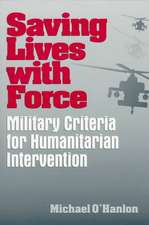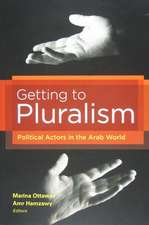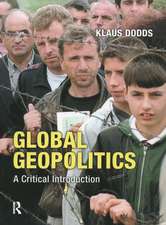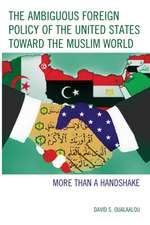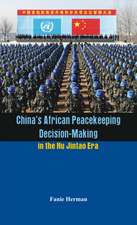Beyond NATO: The Marshall Papers
Autor Michael E. O'Hanlonen Limba Engleză Paperback – 15 aug 2017
In this new Brookings Marshall Paper, Michael O'Hanlon argues that now is the time for Western nations to negotiate a new security architecture for neutral countries in eastern Europe to stabilize the region and reduce the risks of war with Russia. He believes NATO expansion has gone far enough. The core concept of this new security architecture would be one of permanent neutrality. The countries in question collectively make a broken-up arc, from Europe's far north to its south: Finland and Sweden; Ukraine, Moldova, and Belarus; Georgia, Armenia, and Azerbaijan; and finally Cyprus plus Serbia, as well as possibly several other Balkan states. Discussion on the new framework should begin within NATO, followed by deliberation with the neutral countries themselves, and then formal negotiations with Russia.
The new security architecture would require that Russia, like NATO, commit to help uphold the security of Ukraine, Georgia, Moldova, and other states in the region. Russia would have to withdraw its troops from those countries in a verifiable manner; after that, corresponding sanctions on Russia would be lifted. The neutral countries would retain their rights to participate in multilateral security operations on a scale comparable to what has been the case in the past, including even those operations that might be led by NATO. They could think of and describe themselves as Western states (or anything else, for that matter). If the European Union and they so wished in the future, they could join the EU. They would have complete sovereignty and self-determination in every sense of the word. But NATO would decide not to invite them into the alliance as members. Ideally, these nations would endorse and promote this concept themselves as a more practical way to ensure their security than the current situation or any other plausible alternative.
The new security architecture would require that Russia, like NATO, commit to help uphold the security of Ukraine, Georgia, Moldova, and other states in the region. Russia would have to withdraw its troops from those countries in a verifiable manner; after that, corresponding sanctions on Russia would be lifted. The neutral countries would retain their rights to participate in multilateral security operations on a scale comparable to what has been the case in the past, including even those operations that might be led by NATO. They could think of and describe themselves as Western states (or anything else, for that matter). If the European Union and they so wished in the future, they could join the EU. They would have complete sovereignty and self-determination in every sense of the word. But NATO would decide not to invite them into the alliance as members. Ideally, these nations would endorse and promote this concept themselves as a more practical way to ensure their security than the current situation or any other plausible alternative.
Preț: 133.49 lei
Nou
Puncte Express: 200
Preț estimativ în valută:
25.54€ • 26.62$ • 21.15£
25.54€ • 26.62$ • 21.15£
Carte tipărită la comandă
Livrare economică 03-17 aprilie
Preluare comenzi: 021 569.72.76
Specificații
ISBN-13: 9780815732570
ISBN-10: 0815732570
Pagini: 170
Dimensiuni: 127 x 203 x 9 mm
Greutate: 0.19 kg
Editura: Brookings Institution Press
Seria The Marshall Papers
ISBN-10: 0815732570
Pagini: 170
Dimensiuni: 127 x 203 x 9 mm
Greutate: 0.19 kg
Editura: Brookings Institution Press
Seria The Marshall Papers
Textul de pe ultima copertă
NATO expansion has gone far enough
Western nations should negotiate a new security architecture for eastern Europe to stabilize the region and reduce the risks of war with Russia. This new security approach would revolve around permanent neutrality for Finland and Sweden; Ukraine, Moldova, and Belarus; Georgia, Armenia, and Azerbaijan; and finally Cyprus plus Serbia, as well as possibly several other Balkan states. These countries could still join economic and political groups as desired. Russia would have to settle "frozen" and "simmering" conflicts as part of the arrangement. Discussion on the new framework should begin within NATO, followed by deliberation with the neutral countries themselves, and then formal negotiations with Russia.
Western nations should negotiate a new security architecture for eastern Europe to stabilize the region and reduce the risks of war with Russia. This new security approach would revolve around permanent neutrality for Finland and Sweden; Ukraine, Moldova, and Belarus; Georgia, Armenia, and Azerbaijan; and finally Cyprus plus Serbia, as well as possibly several other Balkan states. These countries could still join economic and political groups as desired. Russia would have to settle "frozen" and "simmering" conflicts as part of the arrangement. Discussion on the new framework should begin within NATO, followed by deliberation with the neutral countries themselves, and then formal negotiations with Russia.
Cuprins
Contents:
Introduction and Synopsis
1. How We Got Here
2. A Primer on Europe's Frontier States Today
3. The Case for a New Security Architecture
4. Constructing an East European Security Architecture
Notes
Index
Introduction and Synopsis
1. How We Got Here
2. A Primer on Europe's Frontier States Today
3. The Case for a New Security Architecture
4. Constructing an East European Security Architecture
Notes
Index
Descriere
Argues that now is the time for Western nations to negotiate a new security architecture for neutral countries in eastern Europe to stabilize the region and reduce the risks of war with Russia. Michael O'Hanlon believes NATO expansion has gone far enough. The core concept of this new security architecture would be one of permanent neutrality.
